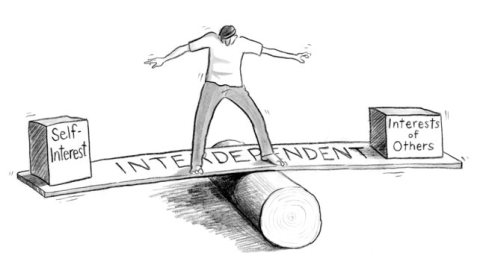The Logical Limits of Liberty & Needism

Your needs can’t all be as easily fenced off as land. But that map-like model lurks behind unbalanced ideas about private and public interests. The “public good” is both bedrock and climate to all private interests. No logic of liberty should ignore their inalienable interdependence.
The “tragedy of the commons” shows why: Herders using a commons (public pasture) seemingly have rational incentives to add animals; grazing is free, and profits can be increased. But if others do the same, the commons becomes overgrazed. So short-term asocial self-interest becomes self-defeating, causing collective tragedy. Two fixes are known; either fence off, assign property rights, and leave it to the new owners; or manage the commons for everyone’s benefit, which entails restricting freedom of use, but prevents tragedy (Elinor Olstrom’s Nobel Prized-work showed how). The moral: too much “freedom in a commons brings ruin to all.”
The “public good” and the nation itself both face “tragedy of the commons” logic. In politics, special interests that prioritize their gain above the public good resemble those overgrazing herders. But it’s always irrational to discount the health of what supplies your needs. And no “politics of parts” can work unless the health of the whole governs. A nation isn’t only the sum of its special interests, or even the private interests of its people. A workable nation must balance those with the health of the whole. America’s founders agreed, they defined duties “to promote the general Welfare” and to enact laws “necessary for public good.”
Tocqueville feared that Americans might forget “the close connection between the private fortune of each and the prosperity of all.” But he said “Americans combat individualism by the principle of interest rightly understood,” which “inclines them willingly to sacrifice a portion of their time and property to the welfare of the state.”
Markets also face commons-like logic. Profit seeking that risks damaging markets is best restricted. Concern about large banks posing “systemic risks,” signals a nascent realization of this need.
In describing “the social contract” Hobbes used an image of “the body politic” illustrating that no part thrives alone, and ailing parts risk an unhealthy body. Some politics now borders on becoming a fenced-off “asocial contract,” dominated by asocial (or even anti-social) self-interest. But that map-like model of interests misguides. Even the value of what you do on your land depends utterly on what is happening beyond your fences. No workable logic of liberty can ignore that the common good is the soil in which all private interests grow.
Whatever your political beliefs, they need needism: Know your needs. Don’t damage them, or what supplies them. Don’t let others, either. Or you’re doomed (separately and jointly).
Illustration by Julia Suits, The New Yorker Cartoonist & author of The Extraordinary Catalog of Peculiar Inventions.




